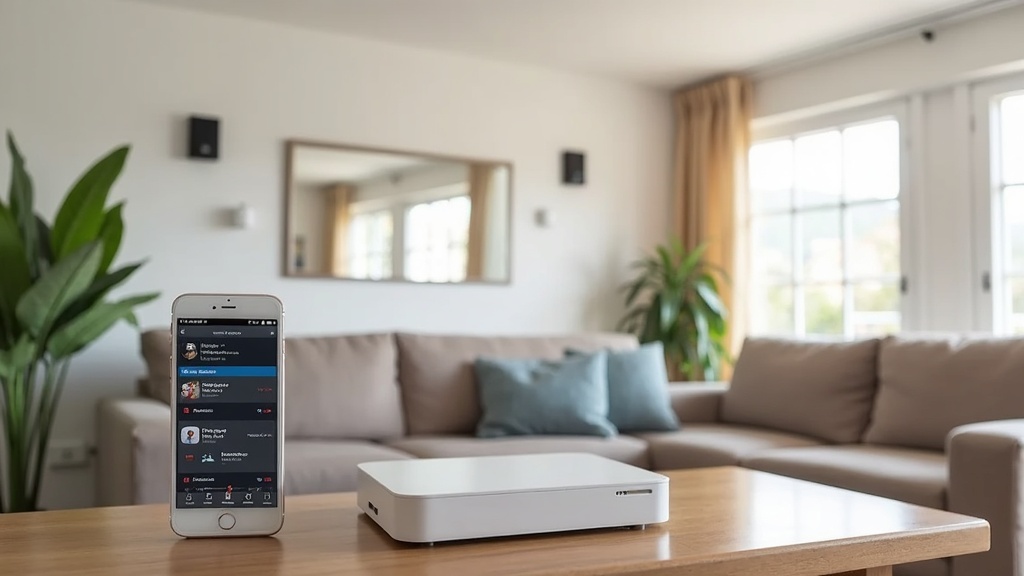Setting up a smart security system at home is a great way to boost peace of mind, whether you want to keep an eye on deliveries, watch over pets, or simply prevent break-ins. With so many options out there, picking the system that actually fits your lifestyle and budget can be pretty confusing, so I’m here to break things down and help you pick the right smart security setup for your home.

Getting Started: What Makes a Smart Security System?
Smart security systems are more than just alarms; they are setups that link to your phone or smart speakers, so you can check in even if you’re halfway across the world. Usually, these systems come with a base hub, sensors for doors and windows, motion detectors, and cameras. Some setups even let you lock doors, talk to whoever’s at your front porch, or sound a loud siren—all from your phone. Updates and alerts get sent straight to your devices, letting you handle things quickly if something seems off.
People turn to smart security for all sorts of reasons—some want a basic system just for the front door, while others want full house coverage. Before making any decisions, I always recommend taking a quick walk through your space and jotting down which doors and windows you want covered, if you want indoor and/or outdoor cameras, whether you’ve already got any smart home gear that needs to play nicely with your new security system, and if you’d rather handle monitoring yourself or hire a pro.
How to Choose the Right Home Security System
Choosing a system isn’t just about picking the most eye-catching camera or the one loaded with fancy features. Here’s what I always check before I suggest anything:
- DIY vs. Professional Installation: Some smart security systems are designed for easy installation, which can save you money. Others work better if a professional comes in and wires everything up—especially if you have a large home or want a more permanent setup.
- Monitoring Options: Decide if you want to monitor alerts yourself (your phone buzzes, and you react) or pay a company to keep watch for you and contact authorities if something happens. Self-monitoring is free, but professional monitoring generally delivers a quicker response if you’re away or sleeping.
- Device Compatibility: If you’ve already got Alexa, Google Home, or Apple HomeKit, check that the system you choose works well with your gear. Some security systems only sync up with specific voice assistants or smart home platforms.
- Camera Quality: Look for cameras with at least 1080p HD resolution, good night vision, and a wide field of view. If you want to zoom in on license plates or faces, some systems offer 2K or 4K cameras, but these usually cost more.
- Expansion: Think ahead—will you need to add more sensors or cameras in the future? Go for a system that’s a breeze to expand, so you’re not forced to buy a whole new kit later.
- Mobile App Features: A solid app makes all the difference. I look for something simple to use that lets you set custom alerts, stream video clearly, and check event history without trouble.
Top Smart Home Security Systems to Consider
With so many options, it’s smart to focus on a few well-reviewed choices. Here are several home security platforms that have been found to be dependable and genuinely user friendly:
- SimpliSafe: A super simple, straightforward setup. SimpliSafe comes with a range of sensors and cameras, works with Alexa and Google Assistant, and offers optional professional monitoring. There are no contracts, and install is DIY-friendly.
- Ring Alarm: Owned by Amazon, Ring syncs up with loads of smart home gadgets. It’s great for those who love video doorbells and want a modular system. Monthly monitoring is affordable, and self-monitoring costs nothing extra.
- Abode: Stands out for its flexibility with Apple HomeKit, Zwave, and Zigbee. Abode is great for people who want to add other smart gadgets later. It’s easy to install and doesn’t tie you into contracts.
- Wyze Home Monitoring: If you’re on a budget, Wyze delivers excellent value—affordable sensors and cameras, free basic use, and ultra-cheap pro monitoring if you need it.
- Eufy Security: Top-notch cameras (even battery powered), free video storage with no monthly bills, and solid privacy. Eufy is especially worth checking out if you want to skip cloud subscriptions.
If you’re someone who wants full control over your smart home setup, these systems all provide customizable features and reliable alerts. It’s also worth chatting with friends who own smart security systems for personal insights—they’ll often point out things you might miss, like installation quirks or unique perks with certain brands.
Are Smart Home Security Systems Worth It?
From what I’ve seen, smart home security is well worth the investment for that extra peace of mind and convenience. Even just having door and window sensors along with a camera on your porch can be a big deterrent to break-ins. Being able to check in from anywhere, and having instant alerts, just makes life easier and safer.
If you want flexibility, self-monitoring, and the chance to add features as you go, smart security systems really pay off. Over the past few years, the price has gotten lower—what used to be out of reach for many is now possible for a few hundred bucks, especially with do-it-yourself installation.
Whether you own your place or are renting, these systems work. They’re wireless, easy to set up, and just as easy to take with you when you move. Plus, you only pay for what you need, and you control how much or how little coverage you have.
How to Choose the Right Security Camera System
Cameras are a huge part of any smart security setup, and picking the right ones can be tricky. Here’s my detailed checklist for picking a camera system that fits your home:
- Wired vs. Wireless Cameras: Wireless cameras are easy to place anywhere and connect over WiFi. Wired cameras need planning but offer constant power and no signal interruptions.
- Indoor vs. Outdoor: Make sure cameras you plan to put outside are built to withstand the weather. Always check the IP rating for rain and snow resistance.
- Field of View: The wider the field, the fewer cameras you’ll need. Look for cameras offering around 130 to 160 degrees.
- Night Vision: Night vision is crucial for clear images after dark. Always check video samples or reviews to see how they perform at night.
- Two-Way Audio: Many cameras let you listen and talk—super helpful for greeting guests or scaring off porch pirates.
- Storage: Some offer cloud storage for a monthly fee; others use micro SD cards for local storage. Free options save money over time, but remember, if the camera goes missing, so does your footage.
I recommend using a mix of outdoor and indoor cameras, covering every entry. For the best security, place cameras in hard-to-reach spots with a good view of driveways or pathways.
Best Smart Home Security System Without Monthly Fee
If you’re not a fan of monthly subscriptions, you’re in luck. You can get serious protection without ongoing costs. Here are systems offering solid value with no monthly fees:
- Eufy Security: Most Eufy cameras and alarms include local storage at no extra charge and send alerts straight to your phone.
- Abode: Free to use for basic features like arming, disarming, and notifications. You can add pro monitoring only if you want it.
- Wyze: Self-monitor with free app alerts, saving footage to a micro SD instead of paying for cloud storage.
With these options, you just pay for the gear upfront. Should your needs change, it’s easy to add pro monitoring later.
Things You’ll Want to Think About Before You Buy
Picking a smart home security system isn’t something to do last-minute. Here are a few practical tips I always mention:
- WiFi Coverage: A weak signal can mean missed alerts or glitchy videos. If your router’s far from your cameras, consider a WiFi extender.
- Power Outages: Some systems have battery backups so they keep working even if the power or Internet drops. This can be a deciding factor for some households.
- Privacy: Make sure to read how each brand handles your recorded footage. Local storage is most private, but some cloud storage services secure your data with end-to-end encryption.
- Support and Updates: Go with a company that rolls out regular updates and offers helpful support. Outdated gear can be more vulnerable to hacks.
- Return Policy: If you’re not sure which system you’ll like best, buy from a seller with a good return window so you can test risk-free.
Frequently Asked Questions
Which smart home security system is best?
There’s no single “best” setup, but most people find SimpliSafe, Ring, and Abode work really well for ease of use, flexibility, and price. Choose based on your budget, what smart home tech you already have, and whether you want pro or self monitoring.
Are smart home security systems worth it?
For extra peace of mind and convenience, most users are happy with their investment. Motion alerts, video clips, and remote viewing help spot issues early—whether it’s checking for a missing delivery or catching a problem at home when you’re away.
What’s the best smart home security system without a monthly fee?
Eufy and Wyze both offer strong setups that let you control your cameras and recordings with no recurring cost. Abode lets you stick to basic features for free and only upgrade if you want professional monitoring later.
How should I choose the right security camera system?
Consider where you need cameras. Make sure they’re weather-resistant for outdoors, pick higher-resolution options for larger spaces, and pick cameras with two-way audio if you like communicating with visitors. Also check if your internet can handle the extra devices, and decide between local and cloud storage.
